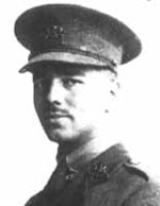
(18 March 1893 – 4 November 1918) was an English poet and soldier, one of the leading poets of the First World War
. His shocking, realistic war poetry on the horrors of trenches
and gas
warfare was heavily influenced by his friend Siegfried Sassoon
and stood in stark contrast to both the public perception of war at the time, and to the confidently patriotic verse written earlier by war poets such as Rupert Brooke
.
Bent double, like old beggars under sacks,Knock-kneed, coughing like hags, we cursed through sludge,Till on the haunting flares we turned our backsAnd towards our distant rest began to trudge.
![]()
Men marched asleep. Many had lost their bootsBut limped on, blood-shod.
![]()
Gas! GAS! Quick, boys! — An ecstasy of fumbling,Fitting the clumsy helmets just in time;But someone still was yelling out and stumbling,And flound'ring like a man in fire or lime...Dim, through the misty panes and thick green light,As under a green sea, I saw him drowning.
![]()
He dropped, — more sullenly than wearily,Lay stupid like a cod, heavy like meat,And none of us could kick him to his feet;— Just blinked at my revolver, blearily;— Didn't appear to know a war was on,Or see the blasted trench at which he stared.
![]()
What passing-bells for these who die as cattle?— Only the monstrous anger of the guns.Only the stuttering rifles' rapid rattleCan patter out their hasty orisons.No mockeries now for them; no prayers nor bells;Nor any voice of mourning save the choirs, —The shrill, demented choirs of wailing shells;And bugles calling for them from sad shires.
![]()

